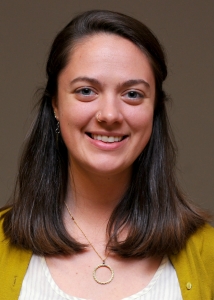 By Emilie Bouvier
By Emilie Bouvier
Looking back, I can point to the moment I first demonstrated that I’m a community organizer at heart – and a church organizer at that.
I was in first grade. I was a pastor’s kid in a small town church in rural Nebraska. As most pastor’s kids can relate, I spent a lot of time at the church, and was mostly the quiet, contemplative sort. I listened closely and felt a sense of spiritual connectedness even from that young age. So naturally, one Sunday when I watched the congregation gather for communion, I knew I wanted to be a part of it.
When we got home from church that day, I excitedly and seriously asked my dad (aka the pastor) if I could take communion. Now, my poor dad – navigating the tension between pastoring, parenting, and upholding the parish culture as a lowly first-call pastor – kindly explained to me that kids have to wait until 5th grade to take communion. “But why?” Well, I was told, it’s about being old enough to really understand what it’s all about. “But I DO understand … !” I started to expound my theological understanding. But then came the best kind of response you can offer to an over-achieving first-born – “Well, sweetheart, not everyone does. Yes, you really do have a lot of understanding for someone your age, but it wouldn’t be fair if you got to take communion and your classmates didn’t.”
“So naturally, one Sunday when I watched the congregation gather for communion, I knew I wanted to be a part of it.”
Now, this satisfied me for all of about 10 minutes. But, of course, young theologian and organizer-at-heart that I was, I suddenly knew what I had to do. The next day, when my dad came home from work he found me sitting at the kitchen table with construction paper, markers, and glue sticks. I was busily preparing little pamphlets explaining all about communion, and invites for all friends at church to come to a communion class that I was going to host.
To me, it was simple. There was a problem – not everyone understands communion – and I was simply going to solve that by leading a workshop and getting all my classmates involved so we could then all take communion together.
You take a big picture problem, break it into a solvable issue, then go get all your people together to do something important so that things are more fair. That’s organizing 101. Bonus points if there’s a theology workshop is involved.
AS I STEP INTO my new role this week as the synod’s Director of Organizing, I’m thinking back on my own path to this vocation, and the work that lies ahead. I first started my work at the synod as a contract congregational organizer, spending 10 hours a week doing 1-1s and meetings with congregations about environmental justice. Now, we have a team of four, with a whole pile of markers, flip chart paper, and protest signs piled in the corner of our shared office. Go find your peers, find your construction paper, and make things happen.
We have some serious problems in our midst. Our fragile and finite planet is faltering under the weight of our collective decisions, with devastating effects. Racism infects all the systems and structures of which we’re a part. Payday lenders continue to prey on the financially vulnerable, draining resources from local communities.
“To me, it was simple. There was a problem – not everyone understands communion – and I was simply going to solve that by leading a workshop and getting all my classmates involved.”
Yet, in the past number of weeks, more than 100 eco-minded folks from 35 congregations around the synod showed up learn and take action at an event geared toward climate and water stewardship; six leaders of colors dug in deep at organizing training and are leading on the synod’s SOAR team (Strategic Organizing Against Racism) to strategize local action on structural racism; two rostered ministers met with Rep. Tom Emmer’s congressional aide, connecting local stories about predatory lending to the conversation at the national level. You take a big picture problem, break it down, and find your people.
I think back on all the workshops on issues and organizing tools, from past Bishop’s Theological Conferences to this year’s series on “The Challenge of Leadership: Ministering in an Election Year,” and I think of how our capacity for understanding has grown over the past years, as we seek to be courageous, strategic, organized in our current context. Practice organizing 101. Bonus points if there’s a theology workshop involved.
Now, I’ll confess that I didn’t end up getting to take communion during first grade. As it turns out, my pastor-dad had already pushed the congregation to move first communion up from confirmation to 5th grade, which was met with much push-back, and knew he didn’t have the political capital to push it any further. He says it was an early lesson for him on pastoral authority verses congregational piety. If it were me now, I’d go back to the (Crayola) drawing board and look for a more winnable issue to empower youth leadership in the church.
Organizing is definitely not easy work, but it’s a joy to be called into it. And I couldn’t ask for a better faith community or a better team of colleagues with whom to share this calling. Now, let’s grab the markers and get to it!
